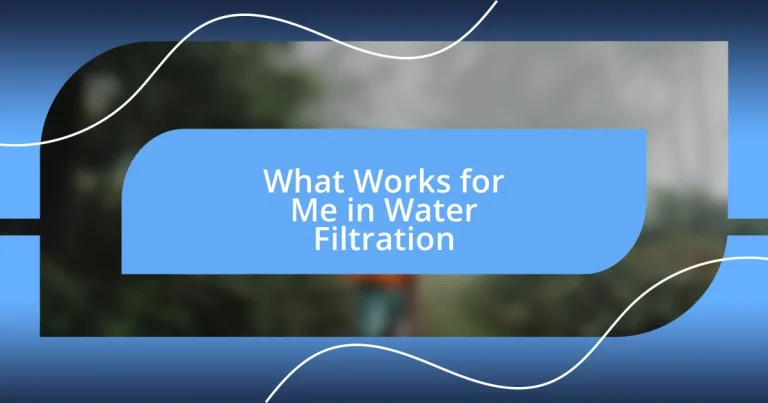Key takeaways:
- Water filtration enhances overall health by removing contaminants, improving taste, and contributing to long-term savings.
- Choosing the right filtration system involves considering personal needs, water sources, and maintenance requirements for optimal performance.
- Regular maintenance and evaluating filter performance over time ensure consistent water quality, providing peace of mind and promoting a healthier lifestyle.
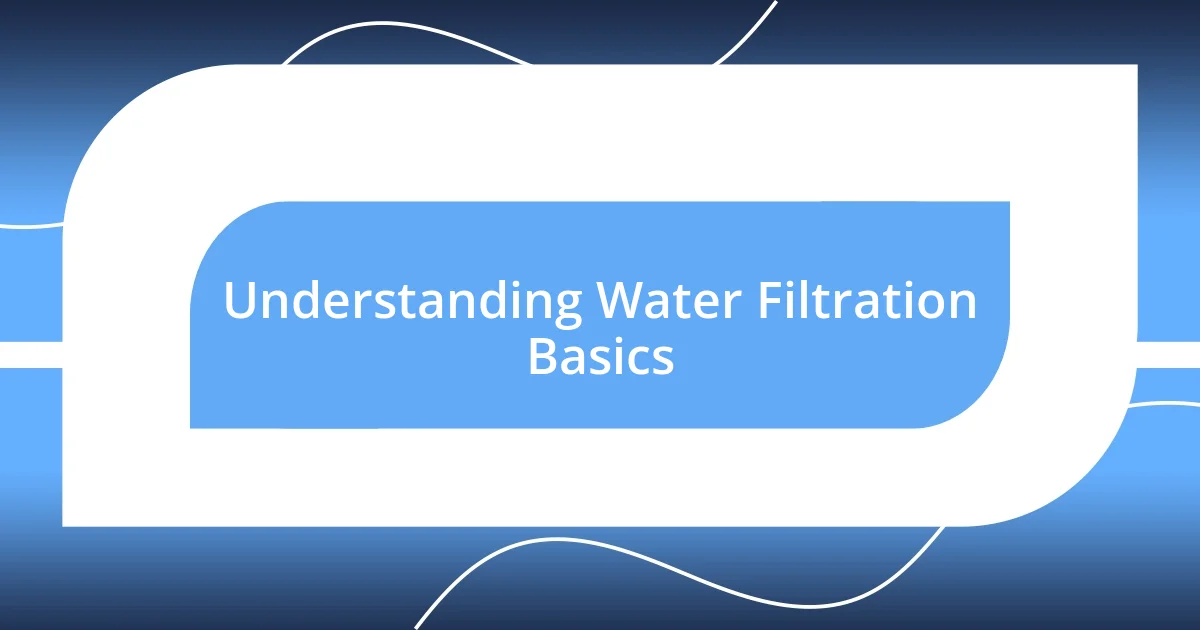
Understanding Water Filtration Basics
Water filtration might seem like a simple concept, but it’s deeply important to our everyday lives. I remember the first time I tasted filtered water compared to tap water. The difference was astonishing! It made me wonder how much we might take for granted about what we drink daily.
At its core, water filtration removes impurities and contaminants from water, improving its taste and safety. When I installed my first filtration system, I was amazed by how straightforward the process was. It was enlightening to realize I could take control of something as vital as my water quality.
Various methods, such as activated carbon filters, reverse osmosis, and UV purification, each offer unique benefits. Have you ever considered which method might suit your needs best? Understanding these options not only empowers us but has also transformed my perspective on health and well-being.
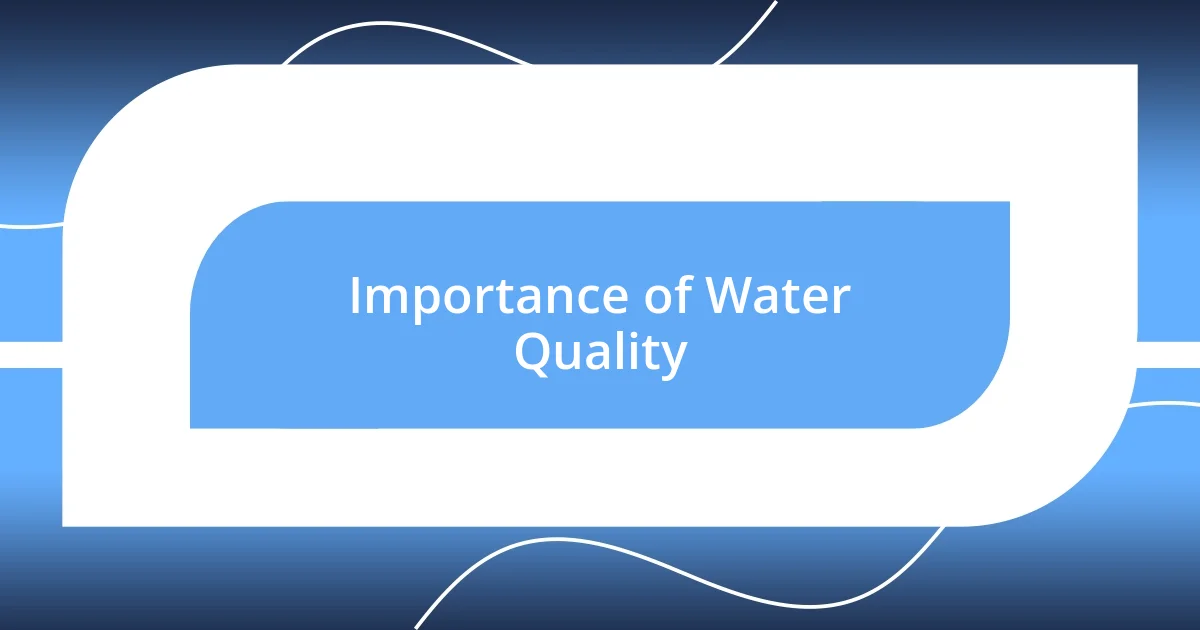
Importance of Water Quality
Water quality plays a crucial role in our health and everyday living. I’ve come to appreciate just how much the water we drink impacts our energy levels, digestion, and overall well-being. There was a time when I didn’t think twice about the quality of my water, until I experienced regular headaches and fatigue. It was only after switching to filtered water that I started to feel more vibrant and lively, a stark reminder of the unseen effects that contaminants can have on us.
The importance of water quality can be highlighted through several key points:
- Health Benefits: Clean water reduces the risk of disease and improves bodily functions.
- Taste and Aroma: Filtered water provides a fresher taste, enhancing the enjoyment of drinks and cooking.
- Environmental Impact: High-quality filtration can lessen the reliance on bottled water, reducing plastic waste.
- Long-term Savings: Investing in a water filtration system can save money over time by reducing bottled water purchases.
When I think about these factors, I realize how my choice of water has transformed not just my health, but also my lifestyle.
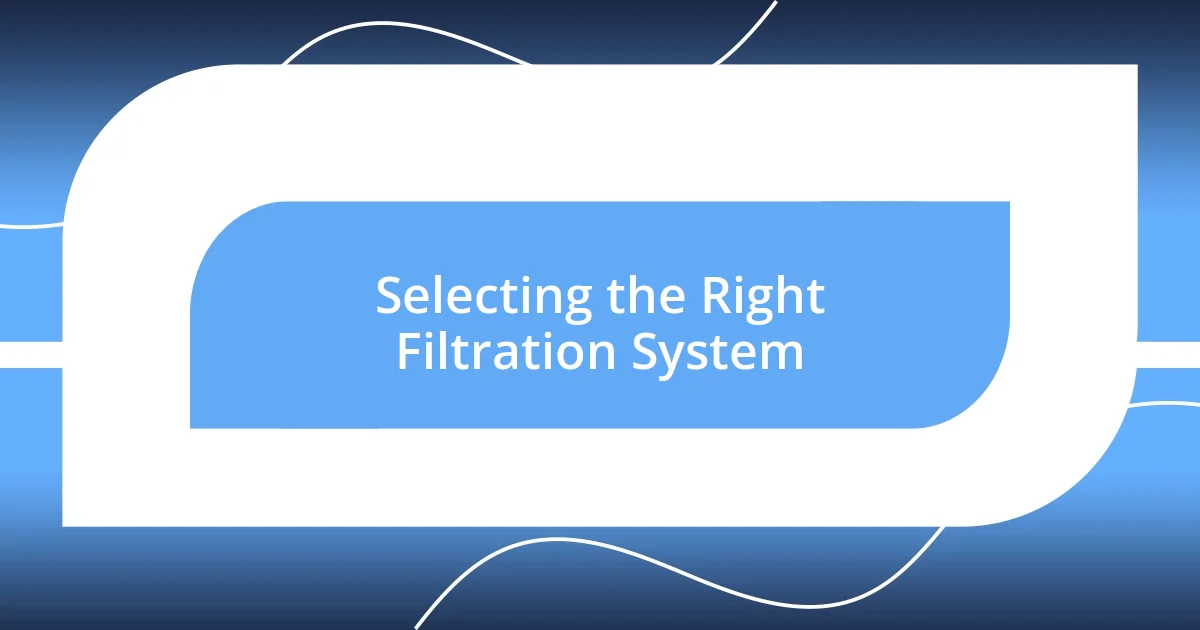
Selecting the Right Filtration System
When it comes to selecting the right filtration system, I always think about my specific needs and preferences. For instance, I wanted something simple and effective, so I gravitated towards an activated carbon filter. The first time I replaced the filter cartridge, it was like opening a window and letting in fresh air—I could taste the difference immediately! Have you felt that thrill when you realize your water just got a whole lot better?
Another critical aspect is the water source. If you’re relying on well water, you might need a multi-stage filtration system to tackle various contaminants. I remember my friend, who lived near farmland, struggling with sediment and chemicals in her water. After researching, she opted for a reverse osmosis system, and the improvement was game-changing. We all have different needs, so understanding yours can make a significant impact.
Lastly, don’t overlook maintenance and costs. I once thought I’d save by going cheap, but spending a bit more for a reliable system with long-lasting filters turned out to be a smart investment. Honestly, the peace of mind from knowing my family is drinking safe water makes every penny worth it! Take some time to evaluate your options, and you’ll likely feel confident about your choice.
| Filtration Method | Pros |
|---|---|
| Activated Carbon | Removes chlorine, improves taste and odor |
| Reverse Osmosis | Effective against a wide range of contaminants |
| UV Purification | Kills bacteria and viruses without chemicals |
| Multi-Stage Systems | Combines multiple methods for comprehensive filtration |
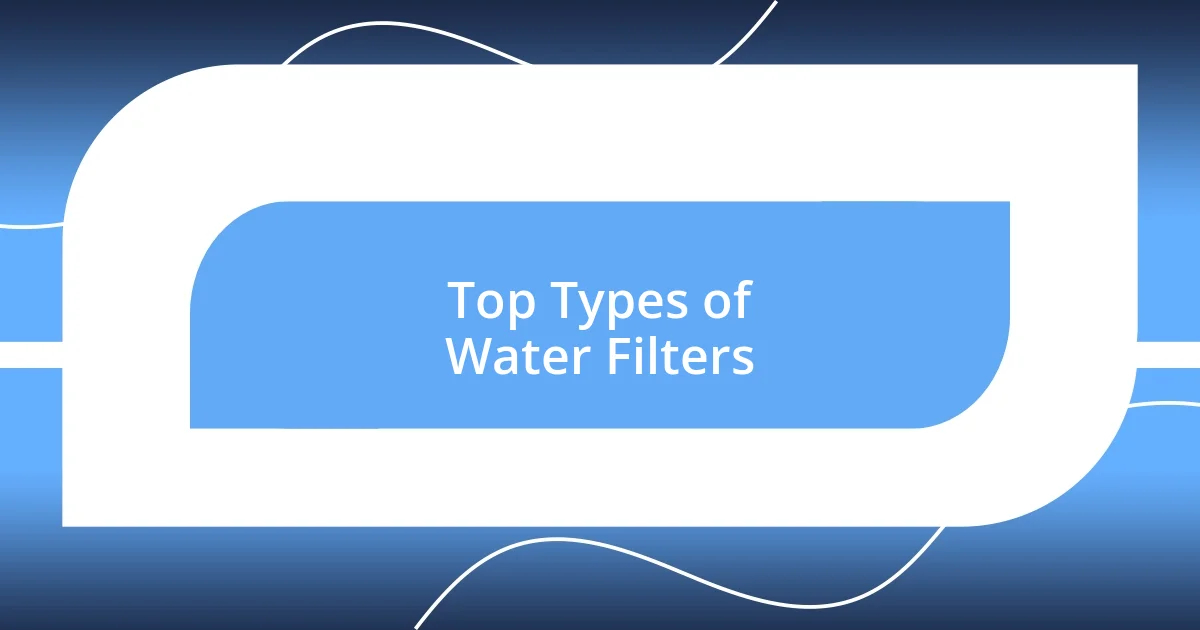
Top Types of Water Filters
When diving into the world of water filters, I find the variety surprisingly exciting. Take activated carbon filters, for instance. They’re so straightforward yet effective! I remember my first experience with one; the clarity of the water was astonishing. I didn’t realize just how much chlorine impacted my drinking experience until I tasted the crispness of filtered water. Isn’t it fascinating how something so simple can transform our everyday hydration?
Another standout for me has been reverse osmosis systems. I still vividly recall the moment my neighbor installed one. We were chatting over cups of coffee, and she couldn’t stop raving about the purity of her water. There’s a notable peace of mind that comes with knowing your system can filter out a wide range of contaminants. I often wonder: aren’t our bodies worth the extra step for truly clean water? The difference in taste was palpable, and I couldn’t help but think about all the unseen impurities we often overlook.
Lastly, I’ve come across UV purification, which absolutely intrigued me. It’s a chemical-free solution, killing off bacteria and viruses in an instant. I remember being skeptical at first—but my friend swore by it for her family, especially since they sometimes traveled to rural areas where water quality was uncertain. Hearing her stories about how effortlessly safe her water was made me rethink my choices. Have you ever paused to consider how easy it can be to ensure the safety of your drinking water? The convenience of this method is hard to beat when you want peace of mind without the hassle of chemicals.
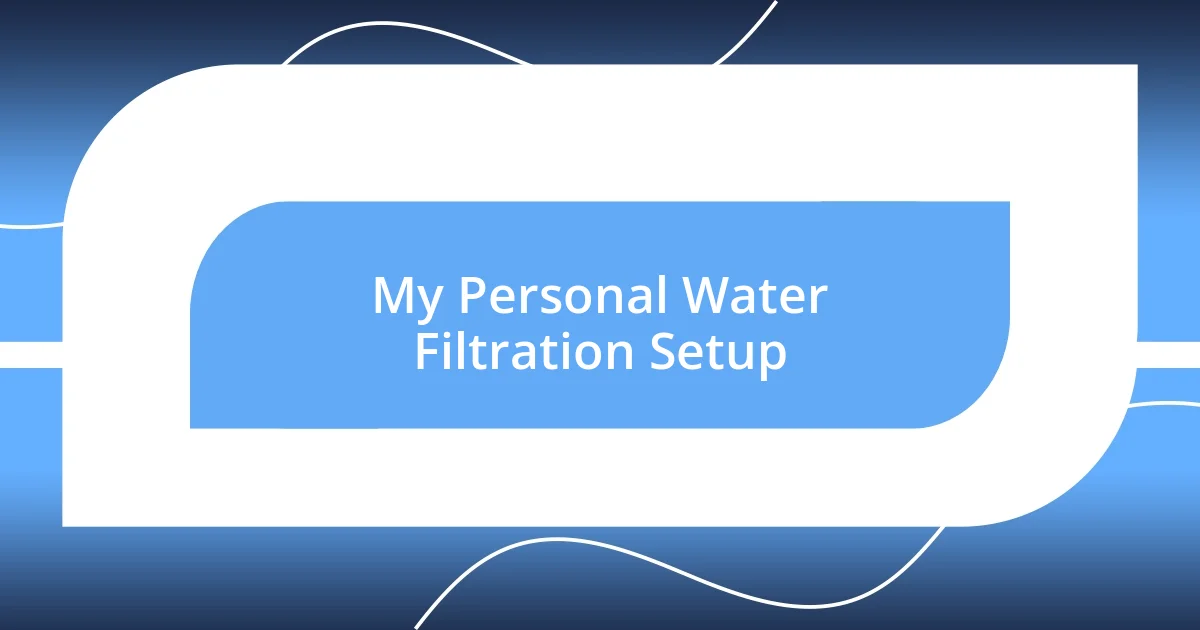
My Personal Water Filtration Setup
Setting up my personal water filtration system was a journey filled with trial and error. Initially, I started with a simple pitcher filter, which worked well enough, but over time, I realized that my water wasn’t as pristine as I hoped. After a particularly eye-opening weekend camping trip, where we had to rely on bottled water, I came home craving that pure taste again. It pushed me to upgrade to an under-sink activated carbon system, and wow, what a difference it made!
I remember the day I installed my new system—it was like a mini DIY project that brought out my inner handyman. The excitement of turning on the tap and tasting that fresh, clean water for the first time was exhilarating. It felt like a little victory. If you’ve ever felt the joy of a small achievement, you’ll understand how that simple act of installation gave me a sense of control over my family’s hydration. Don’t underestimate how satisfying it can be to take charge of your water quality!
When I chat with friends about my filtration setup, their eyes often light up with curiosity. It’s not just about the technology; it’s also about the peace of mind it brings. Knowing that I’ve removed a good amount of contaminants provides a kind of assurance that I can’t put a price on. Have you ever considered how much your health relies on something as fundamental as water? It’s this realization that keeps me enthusiastic about sharing my experience—because I want others to feel that same sense of security and confidence in what they drink every day.
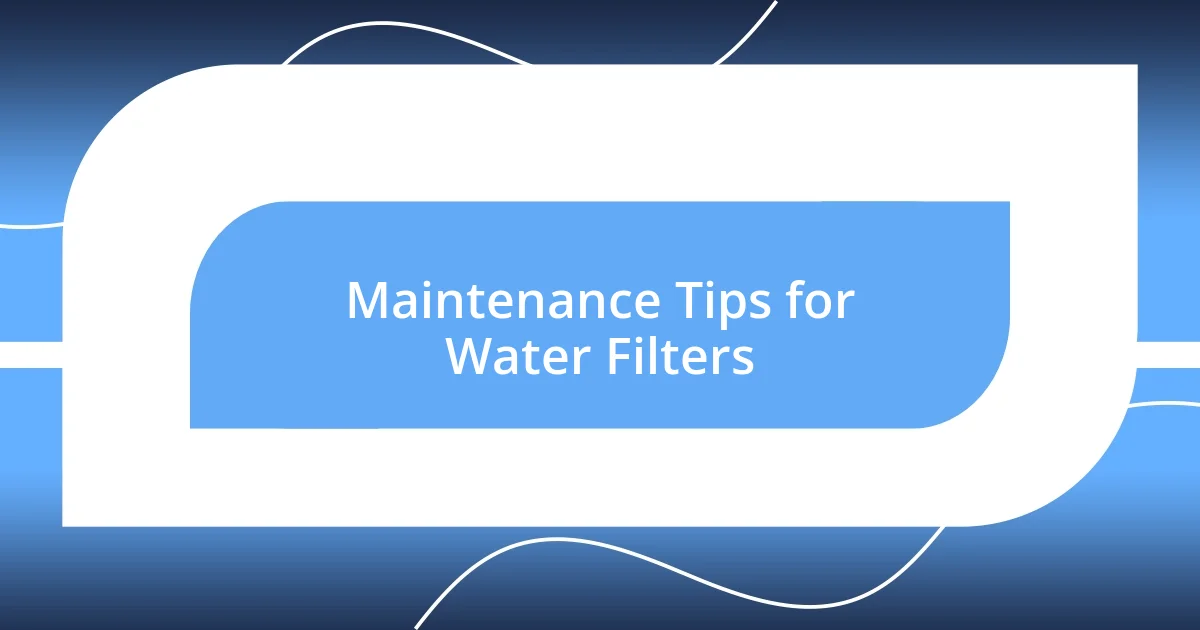
Maintenance Tips for Water Filters
Regular maintenance of your water filter is essential for ensuring clean and safe drinking water. I can’t stress enough how crucial it is to check the filters periodically. For instance, when I first installed my system, I wasn’t mindful of the replacement schedule and ended up with less effective filtration. It dawned on me that having a reminder set on my phone turned out to be one of the best decisions I made. What about you? Have you ever thought about how much easier it could be to keep track of such an important task?
Cleaning the housing of your filter is another aspect that often gets overlooked. The first time I did this, I was amazed at how much debris had accumulated—not the kind of line-up you want in your water! I typically use a mixture of vinegar and water, which not only sanitizes but also removes mineral deposits. It’s a small effort that pays off significantly. Have you considered how a simple cleaning session could dramatically improve the taste of your water?
Lastly, pairing your maintenance routine with water testing can provide even greater peace of mind. I remember after a storm; I felt compelled to test my tap water, and I was surprised by the results. Knowing exactly what’s in your water can help you decide when to replace your filter or if additional treatment is warranted. It’s all about staying proactive. Don’t you agree that taking control of your water quality leads to a healthier lifestyle?
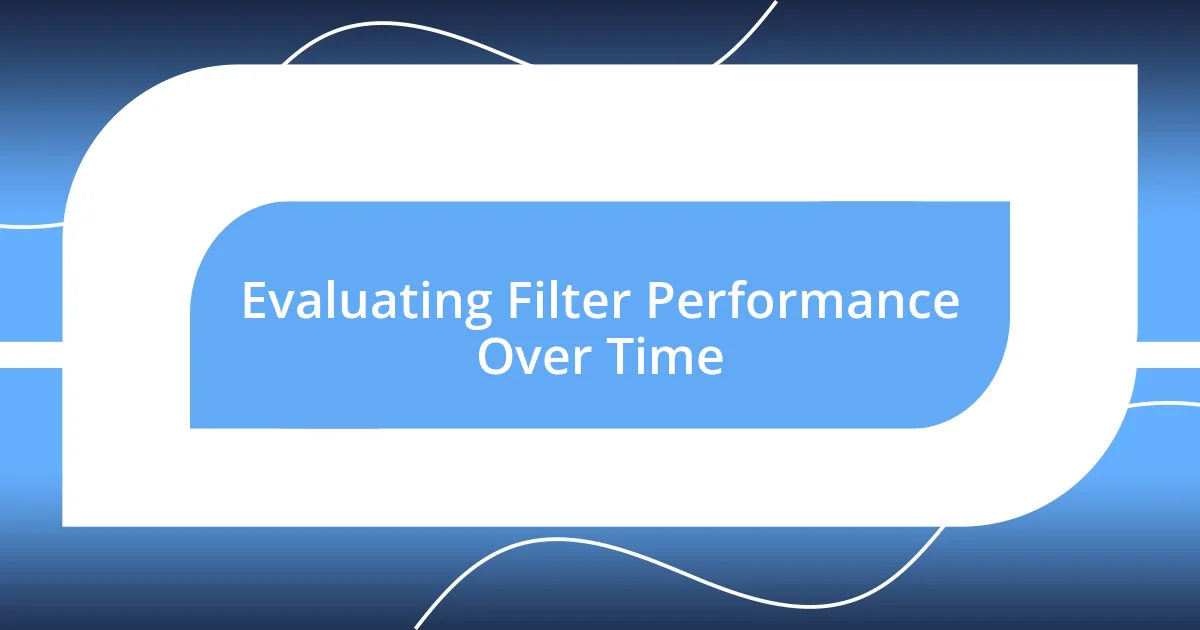
Evaluating Filter Performance Over Time
Evaluating the performance of a water filter over time can feel like a daunting task, but it’s essential for maintaining the quality of your drinking water. I vividly remember checking my filter after six months and discovering that it had clogged more than I expected. It struck me that visual inspections often provide immediate feedback on whether the unit is still doing its job or if it’s time for a change. Have you ever been surprised by what you find when you take a closer look?
One trick I’ve learned is to keep a log of my filter changes and water quality tests. This simple habit has transformed how I assess performance; it allows me to identify patterns and anticipate when a replacement is truly necessary. When I was faced with an unexpected taste change in my water, I referred back to my notes and realized I had skipped a replacement—the cognitive dissonance was real! It’s moments like these that reinforce the importance of routine evaluations.
Over time, I’ve also begun comparing my filter’s output against tap water tests to gauge its effectiveness. The first time I did this, I was excited to see how much better the filtration was performing than when I had that simple pitcher! It’s like the filter became a trusted companion on my health journey. Have you pondered how such evaluations not only ensure that you’re drinking cleaner water but also empower you to make informed decisions about your health?












